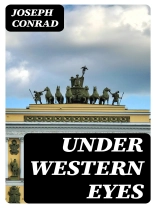In ‘Under Western Eyes, ‘ Joseph Conrad offers a profound exploration of the complexities of identity and morality during the turbulent political landscape of early 20th-century Europe. Set against the backdrop of Tsarist Russia, the narrative unfolds through the perspective of multiple characters, notably the conflicted protagonist, Razumov. Conrad’s masterful prose embodies a psychological depth that reflects modernist literature’s preoccupation with inner consciousness, employing a fragmented narrative style that evokes the ambiguity and duality of truth and perception. The themes of betrayal, revolution, and the struggle for autonomy resonate throughout this seminal work, inviting readers to probe the moral ambiguities inherent in human action and political ideology. Joseph Conrad, born in Poland and later naturalized as a British citizen, draws heavily on his own experiences of cultural upheaval and exile. His intimate understanding of displacement and existential struggle informs the psychological depth of his characters, making them both relatable and complex. Conrad’s firsthand encounters with imperialism and his philosophical inquiries into human nature significantly shaped his worldview, and these influences permeate ‘Under Western Eyes.’ The novel reflects his concerns regarding the moral implications of political systems and the individual’s role within them. This enduring work is essential for readers interested in the interplay of personal and political turmoil. Its rich narrative and profound thematic exploration make it a compelling study for anyone curious about the nature of self and society. Whether you are a scholar of modernist literature or a casual reader, Conrad’s insights into the human condition and critical societal commentary will resonate deeply, rendering this novel a timeless classic.
Mengenai Pengarang
Joseph Conrad, born Józef Teodor Konrad Korzeniowski on December 3, 1857, in Berdychiv, Ukraine, then part of the Russian Empire, was a pre-eminent early 20th-century novelist. A master of prose style and a precursor to modernist literature, Conrad drew upon his diverse experiences in the French and British merchant navies to create short stories and novels that reflect aspects of a European-dominated world—while profoundly exploring human psychology. His narrative style and anti-heroic characters have influenced numerous authors and filmmakers. Conrad’s writing trajectory began with the publication of ‘Almayer’s Folly’ in 1895, but he is best known for the novella ‘Heart of Darkness’ (1899) and novels such as ‘Lord Jim’ (1900), ‘Nostromo’ (1904), and ‘The Secret Agent’ (1907). In ‘Under Western Eyes’ (1911), Conrad examines themes of terrorism, espionage, and betrayal, rendering a complex psychological landscape within a political context. It is this discerning introspection coupled with his narrative innovations and evocative use of the English language, which was his third language after Polish and French, that cements his reputation as a significant figure in the annals of the English novel. He straddled the Victorian and modernist worlds, consistently exploring the depths of human consciousness and the often ambiguous nature of moral action. Conrad’s works continue to attract scholarly attention and are considered to be of significant literary and cultural importance. He passed away on August 3, 1924, in Bishopsbourne, England, leaving behind a rich legacy that continues to resonate.












